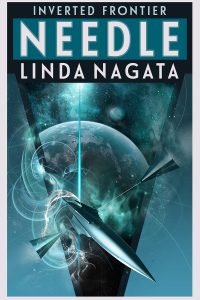Alexandra Pierce Reviews Triangulum: An Epic of the Nine Worlds of Surya by Subodhana Wijeyeratne
 Triangulum: An Epic of the Nine Worlds of Surya, Subodhana Wijeyeratne (Rosarium Publishing 979-8-98661-460-1, $19.95, 300pp, tp) January 2024.
Triangulum: An Epic of the Nine Worlds of Surya, Subodhana Wijeyeratne (Rosarium Publishing 979-8-98661-460-1, $19.95, 300pp, tp) January 2024.
In his first novel, Subodhana Wijeyeratne takes elements of religious stories from the Indian subcontinent and reimagines them in space, with godlike aliens and humanity spread across the solar system. None of these aspects are apparent from the outset, but are gradually revealed as the story unfolds in epic, and sometimes gory, detail.
Wijeyeratne introduces the key protagonists in rapid succession. The story opens with a colossal creature appearing from a space-time rupture, and then reanimating a goddess – the Night. Focus quickly shifts from the immense to the mundane, with refugees Indra and his family arriving on a new planet, where their hoped-for help turns out to be a slaver. He sells the parents but keeps Indra himself, after castrating him; while captive, Indra is grudgingly befriended by another enslaved child, Kadrū. Not far away geographically, but miles away metaphorically, are the Crown Prince and Princess of Yama, and their daughter, Danu. Finally, there’s the Ox, who wields the Metaphorical Hammer. The reader is also introduced to the fact that humans live on several different worlds; that their appearances vary greatly from baseline humanity; and that humanity and the whole system are ruled by a goddess, the Dawn, with assistance from her Charioteer and the Ox.
If that sounds like a whirlwind, it certainly feels like it – that’s just the first ten percent of the book. Indeed, initially I wondered if I had stumbled into an ongoing story, and if I were meant to already know the people involved. But despite sometimes feeling like I was floundering, I was able to follow events and felt connected to most of the characters.
The story’s pace is relentless throughout. Indra and Kadrū are quickly sold to different people, where they learn new skills: Indra becomes a sort of librarian, and meets Danu, while Kadrū is initially a servant and then becomes an assassin. The Surya system is revealed to be our own solar system, and the Night, the Dawn, and the Ox are not gods but aliens, Triangulans, who fought humanity millennia ago and installed themselves as deities. A minor character is a sort of computer program who seems to have been a last-ditch attempt by humanity to thwart their would-be overlords.
At heart, this is a story of rebellion: humans rebelling against their godlike overlords, and also rebelling against the place that fate seems to have allotted them; there is division amongst the gods/aliens as well. It’s not, though, a simple ‘‘heroes and villains’’ story. The Night has returned to Surya to continue her eternal contest with the Dawn; the Night is far more sympathetic than the Dawn, but the stories told about the Night are much worse, and both commit atrocities. A human rebellion was already starting before this ‘‘godly’’ conflict began, but the two naturally end up impacting on each other. While it seems obvious that the reader would take the part of the humans, again this is problematized. The various human characters find themselves in different, and sometimes opposing, parts of the conflict, and they’re not always the most appealing of people.
The Hindu elements are intentional within the story itself: That is, when the Triangulans annexed the solar system, they deliberately made use of the oldest religions and script they could find, as a way to control humanity and its stories – thus, Hindu names and story parallels. As with any story that uses religious or mythological references, the unfamiliar reader has two choices: to research every reference (Danu, Indra, Surya) to see just how clever the author is being; or to ignore the metatextual levels and just go along for the ride. I initially took the latter path, and the story absolutely holds up by itself: No external knowledge is necessary to appreciate the relationships and struggles of the various characters. Having done some research afterwards, I can also say that it’s clear Wijeyeratne is doing clever things with his characters and their struggles, and I suspect someone with more intimate knowledge of the religion will grasp more complexity than I did.
Wijeyeratne has published several short stories and a short story collection (Tales from the Stone Lotus), and this is an impressive and detailed debut novel: It will be intriguing to see what comes next.
Alexandra Pierce reads, writes, podcasts, cooks and knits; she’s Australian and a feminist. She was a host of the Hugo Award winning podcast Galactic Suburbia for a decade; her new podcast is all about indie bookshops and is called Paper Defiance. Alex has edited two award-winning non-fiction anthologies, Letters to Tiptree and Luminscent Threads: Connections to Octavia E Butler. She reviews a wide range of books at www.randomalex.net.
This review and more like it in the March 2024 issue of Locus.
 While you are here, please take a moment to support Locus with a one-time or recurring donation. We rely on reader donations to keep the magazine and site going, and would like to keep the site paywall free, but WE NEED YOUR FINANCIAL SUPPORT to continue quality coverage of the science fiction and fantasy field.
While you are here, please take a moment to support Locus with a one-time or recurring donation. We rely on reader donations to keep the magazine and site going, and would like to keep the site paywall free, but WE NEED YOUR FINANCIAL SUPPORT to continue quality coverage of the science fiction and fantasy field.
©Locus Magazine. Copyrighted material may not be republished without permission of LSFF.





